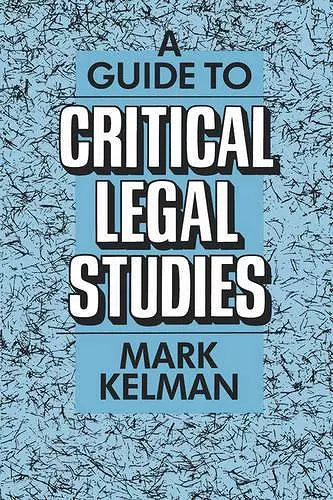A Guide to Critical Legal Studies
Format:Paperback
Publisher:Harvard University Press
Published:31st Mar '90
Currently unavailable, and unfortunately no date known when it will be back

Until now there has been no summary or overview of the wide range of work contributing to critical legal studies, the movement that has aroused such a furor in the communities of law and political philosophy. This book outlines and evaluates the principal strands of critical legal studies, and achieves much more as well.
A good deal of the writing in critical legal studies has been devoted to laying bare the contradictions in liberal thought. There have been attacks and counterattacks on the liberal position and on the more conservative law and economics position. Now Mark Kelman demonstrates that any critique of law and economics is inextricably tied to a broader critique of liberalism.
There are three central contradictions in liberal thought: between a commitment to mechanically applicable rules and to standards that fluctuate with situations; between intrinsic individual values and the objective knowledge of ethical truths; and between free will and determinism. Kelman shows us the pervasiveness of these contradictions in legal doctrine; their connection to broader political theory and to visions of human nature; and, finally, the degree to which mainstream thought tends to privilege certain of these commitments over others.
The author also analyzes two of the most significant components of jurisprudence today the law and economics discipline and the legal process school. He concludes with a lively discussion of the role of law generally and of “cognitive legitimation,” or the ways in which legal thought can make the unnecessary, the contingent, and the unjust seem natural, inevitable, and fair.
The Critical Legal Studies movement, or CLS, has given American legal education its liveliest moments of the last decade… Finding a synthesis of CLS thought is no easy task, and Mark Kelman’s book is an admirable attempt to remedy that lack. He offers an impressive survey of the major CLS writers and their relationship to other schools of legal thought… He strips away hyperbolic rhetoric or fallacious reasoning and exposes what he considers the heart of the CLS position… Kelman’s arguments are powerful. -- Daniel Farber * New Republic *
A comprehensive and vigorously written survey and synthesis of Critical Legal Studies by a partisan of the movement… It is probably the best book to have emerged from the CLS movement. -- Richard A. Posner * Wall Street Journal *
A major summary statement of the varieties of thought associated with the CLS movement. Kelman does an excellent job of engaging with other theories of law perspectives. * Perspective *
Beyond synthesis, the book makes a very significant contribution to the scholarship in this field… Kelman both shows the originality of Critical Legal Studies and thoroughly disposes of the common misreading of CLS. The common misreading is that CLS literature stands for the proposition that legal rules are all totally indeterminate and nonbinding, no rule leads you in any direction, all language is hopelessly indeterminate. Kelman suggests that CLS has never made that claim and clarifies what the CLS assertion of indeterminacy really is… A very impressive work. -- Frances Olsen, UCLA School of Law
This book should take its place as the most accessible, complete, and lucid treatment of Critical Legal Studies. Kelman is also one of the most interesting members of CLS, and the book has numerous virtues. -- Cass R. Sunstein, University of Chicago Law School
ISBN: 9780674367562
Dimensions: unknown
Weight: 463g
367 pages